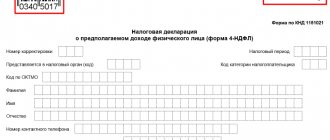Hello! Today we’ll talk about personal income tax for individual entrepreneurs on OSNO. Finally, dear readers, we have reached the topic of paying taxes by an individual entrepreneur in the case when he does not switch to some special regime (simplified taxation, imputation or patent), but remains on OSNO. What taxes does he need to pay? In the general regime there are two main taxes: the first is income tax, the second is VAT.
What is personal income tax
In essence, this fee is an income tax that is levied on residents of the Russian Federation. Foreigners also pay it if they earn money within the country. Tax residents are considered to be people with any citizenship or without it who are in Russia for more than 183 days over a 12-consecutive month period.
Individuals can pay taxes on their own. But the responsibility for calculating personal income tax and its payment is assigned to tax agents - legal entities or individual entrepreneurs, who are required to calculate and calculate the tax according to the law and concluded agreements.
By hiring personnel, the employer becomes a tax agent. He, independently or through the accounting department, calculates the tax, deducts it from the employee’s salary and sends it to the budget.
Algorithm for calculating income tax from wages in 2020 using an example
Let's consider the procedure for calculating and withholding income tax from wages.
Example.
Samokhina L.A. works as a salesperson at Alternativa LLC. Her salary is 30 thousand rubles. per month. Samokhina has 3 dependent children and she wrote an application for a standard deduction.
Tax-free deduction amounts will be:
1,400 rub. – for 1 child;
1,400 rub. – for the 2nd child;
3,000 rub. - for the 3rd child.
The amount of tax to be withheld for January 2021 is: RUB 3,146. ((30,000 – 1,400 – 1,400 – 3,000) *13%)
Having paid the salary, Alternative LLC is obliged to transfer the tax withheld from the salary.
Let's consider the procedure for transferring income tax from wages to the budget.
Should an individual entrepreneur pay this tax?
The rules for paying income tax for individual entrepreneurs depend on the taxation scheme that he applies. Merchants have access to a general and several special regimes that have their own characteristics, including regarding the payment of fees.
In general mode
Businessmen operating under the general tax scheme are required to pay personal income tax. In this case, income is recorded using the cash method, i.e., in accordance with the receipt of funds at the cash desk or to the current account, and not at the time of registration of documentation. This has nothing to do with receiving an advance and final payment. Income is recognized when mutual settlements are made and earnings are received.
Important! A merchant’s own finances aimed at replenishing working capital are not considered income. The same applies to loans, credits and erroneous receipts.
Special modes
Entrepreneurs do not pay personal income tax under the simplified tax system if they receive income from carrying out the activities provided for by their certificate. But there are several cases when you have to pay such a fee on a simplified basis.
Thus, when receiving income from sources unrelated to business activities, an individual entrepreneur pays a 13% fee, like any other individual. However, the payment can be reduced if you have rights to a tax deduction. Another case of paying tax is receiving income from dividends and certain types of earnings, defined in clause 3 of Article 346.11 of the Tax Code of the Russian Federation.
Individual entrepreneurs using a simplified system pay personal income tax when:
- receiving prizes in advertising and promotional events worth over 4,000 rubles;
- savings on interest on loans;
- receiving interest on foreign currency or ruble deposits;
- receiving royalties not related to the main work activity;
- receiving profit from the sale of your property.
The same applies to any financial receipts outside of professional activities from which tax is not withheld by the tax agent.
For other special modes the following rules apply:
- A businessman on UTII does not pay personal income tax on earnings from activities carried out under this taxation scheme.
- From earnings from any other activity, the individual entrepreneur pays personal income tax for himself.
- Working on a patent does not imply the payment of income tax for the types of activities in respect of which this patent is valid.
- When receiving profit from activities not covered by the PSN, the entrepreneur submits a declaration and pays personal income tax.
- On the Unified Agricultural Tax, merchants do not pay this tax, with the exception of earnings from dividends.
If an entrepreneur has not submitted an application for the application of a special regime, he is considered to be working for OSNO and pays taxes in accordance with the requirements for the general scheme. If a simplifier has violated the rules for applying the special regime, he is transferred to OSNO automatically and is obliged to make tax payments properly, taking into account the features of this system.
Important! No tax is charged on payment for a patent.
When is the 13% refund not possible?
Reference. Not all entrepreneurs can receive compensation, and this directly depends on the form of taxation chosen for doing business.
Thus, individual entrepreneurs who use:
- STS (simplified taxation system);
- UTII (single tax on imputed income);
- patented business (when a patent is acquired for a certain type of business);
- Unified Economic Tax (special taxation system for agricultural producers).
The listed taxation systems reduce the payment burden for an entrepreneur in the course of his activities, but at the same time deprive him of the opportunity to receive a property deduction.
How and how much to pay
The peculiarities of paying personal income tax for individual entrepreneurs are related not only to the applied taxation regime, but also to the presence of hired personnel at the businessman’s disposal. Depending on the chosen system, the merchant acts as a tax agent in relation to employees and must withhold personal income tax from the payments he makes. At the same time, the entrepreneur pays tax on his earnings received as an individual.
Without employees
An entrepreneur without employees using the simplified tax system is not considered a tax agent and does not pay personal income tax. But when hiring people under civil agreements, he is obliged to make tax payments on their earnings. In the general mode, a businessman submits reports and pays this tax for himself.
Important! If a businessman combines several taxation schemes, then he must calculate taxes and pay them, as well as provide reporting, in accordance with the requirements for each regime.
With employees
When hiring people, individual entrepreneurs under any regime pay personal income tax for them. This means that a businessman is obliged to submit appropriate reports on time, calculate, withhold and transfer taxes for each employee in accordance with current legislation.
In case of loss of the right to a special regime
Let’s say that at the beginning of the year a businessman worked under one of the special regimes. For example, on the simplified tax system. But during the reporting period, he lost the opportunity to use this method of taxation due to exceeding the income limit or the average number of employees. Then the individual entrepreneur will have to recalculate his own obligations to the tax inspectorate, taking as a basis not the simplified tax system, but the OSNO. The received amount of personal income tax for individual entrepreneurs in 2021 will need to be paid to the budget. Also see “Income tax for individual entrepreneurs on the simplified tax system.”
Read also
31.01.2020
Payment rules
The tax is paid at the place of tax registration. If a tax agent has separate divisions, personal income tax for employees working in them is paid at the location of such divisions.
When filling out a payment order, you must provide the following details:
- Payer status in field 101 - for individual entrepreneur 09, for tax agent 02;
- Budget Classification Code (BCC).
KBK Personal Income Tax 2021 for employees for individual entrepreneurs - 182 1 0100 110. For the entrepreneur himself, the code 182 1 0100 110 is indicated.
When specifying the KBK personal income tax for employees in 2021 for individual entrepreneurs, it is better to check the regulatory documentation to avoid making a mistake.
Entrepreneur – tax agent
If you, as an individual entrepreneur, have employees, then the amount of income you pay to your employees is subject to personal income tax in accordance with the general procedure. You are required to calculate tax and transfer it to the budget, regardless of which tax system you use. When calculating and paying personal income tax for employees, proceed according to the following algorithm:
- Step 1. Calculate the amount of income for each employee. The amount of income subject to personal income tax is the sum of all payments to the employee at the end of the month, including salary, allowances, additional payments, bonuses, bonuses.
- Step 2: Determine the amount of tax deductions the employee can use. You can find a more detailed list of deductions in Art. 218 – 221.
- Step 3. Calculate the amount of personal income tax payable using the formula:
N = (DohRab – VychRab) * Becoming,
- where DokhRab is the employee’s monthly income;
- Deductible – the amount of deductions to which the employee is entitled;
- Stav – the applicable tax rate (in general – 13%, for non-resident employees – 30%).
Personal income tax for employees must be transferred monthly, upon payment of wages. If on 08/03/17 you paid your salary for July, then personal income tax should be transferred no later than 08/04/17.
Example No. 2. 03/02/17 Individual entrepreneur Surguchev paid wages to employees. On the same day, Surguchev calculated and transferred personal income tax to the budget:
| Employee's name | Salary for February 2017 | Award for February 2017 | Income for February 2017 | Personal income tax calculation | Personal income tax amount |
| Sverdlov S.D. | RUB 12,350 | – | RUB 12,350 | RUB 12,350 * 13% | RUB 1,605.50 |
| Shishkina U.V. | RUR 14,880 | – | RUR 14,880 | RUR 14,880 * 13% | RUB 1,934.40 |
| Steklov K.L. | RUB 13,930 | 1,840 rub. | RUB 15,770 | RUB 15,770 * 13% | RUB 2,050.10 |
| Total personal income tax: | RUR 5,590 | ||||
Calculation examples
To calculate personal income tax, you need:
- Determine all income subject to this tax for the reporting period.
- Find out the correct rate for each type of income.
- Calculate the tax base.
- Calculate the payout using the formula.
The formula looks like this: Personal income tax = tax base x tax rate
For example, for an employee with a monthly salary of 58,000 rubles. Personal income tax will be 58,000 x 13% = 7,540 rubles.
If the same employee is entitled to a tax deduction, for example, for a mortgage, its amount is deducted from the tax base.
Penalties
Businessmen often ask accountants what will happen if they fail to submit 3-NDFL? Forgetfulness in this case will cost the businessman money. The fine will be calculated for each full and partial month of delay - 5% of the personal income tax amount. The minimum loss for an individual entrepreneur is 1,000 rubles. In the worst case, the individual entrepreneur will have to pay 30% of the tax amount - this is the maximum limit of the fine, that is, more than 30% cannot be taken from a businessman.
Let's show it with an example. Individual Entrepreneur Timofey Ilyich Amosov sent form 3-NDFL on 06/24/2021. Thus, Amosov T.I. was two months late (an incomplete month is taken as one whole month). The declared personal income tax is 76,140 rubles. This means the fine will be 7,614 rubles (76,140 x 2 months x 5%).
Here's another example. Individual entrepreneur Timofey Ilyich Amosov declared tax in the amount of 393,000 rubles, but submitted the declaration only in November. Following the law, the accountant calculated the fine and received 137,550 rubles (393,000 x 7 months x 5%). The amount received exceeds 30% of the tax (393,000 x 30% = 117,900). Consequently, individual entrepreneur Timofey Ilyich Amosov will pay 117,900 rubles, and not 137,550 rubles.
In addition, for failure to submit a declaration, an entrepreneur may be fined in the amount of 300 to 500 rubles.
Advance payments for personal income tax
For individual entrepreneurs, OSNO provides for payment of personal income tax in two ways. The first is an advance payment, which is made upon notification from the tax authorities. This payment is made:
- Six months before July 15th.
- For the third quarter - until October 15.
- For the fourth quarter - until January 15.
Advance payments are calculated based on the information reflected in the declaration in the previous period, taking into account deductions. If the merchant has not received a notification, he has the right not to make advance payments. However, at the end of the year, personal income tax should be calculated and paid in full.
The second option is an adjustment after submitting the declaration to the tax authorities. The businessman needs to return the extra transferred money from the budget or make additional payments as needed. When the payer's income has changed by more than 50% within the tax period, he needs to submit a return to adjust the advance payments. For this purpose, fill out form 4-NDFL.
Important! If an advance is credited with a delay, a penalty will be charged on the resulting debt.
Payment period
Personal income tax for the year is transferred by the entrepreneur until July 15 of the following year. Other deadlines are provided for tax agents:
- From employee salaries - no later than the next day after payment of income to employees.
- For sick leave and vacation pay - no later than the last day of the month in which these payments were made.
- From dividends paid by LLC - no later than the next day after the funds are transferred.
- From dividends paid by JSC - no later than one month after the date of payment.
In addition to penalties for violating the deadlines for paying personal income tax, an entrepreneur faces a fine of 20%.
Personal income tax is paid by every citizen who receives income in the Russian Federation. This obligation also applies to individual entrepreneurs. If an entrepreneur does not have hired personnel, he pays the fee for himself. If there are employees, the businessman acquires the status of a tax agent and makes payments for each hired employee. The specifics of payments depend on the taxation scheme applied. Thus, for individual entrepreneurs, the general scheme provides for advance payments with subsequent adjustments.
Tax amounts may be reduced if you are eligible for appropriate deductions. There are certain deadlines for paying the fee, and in case of violation, penalties and fines will apply.







